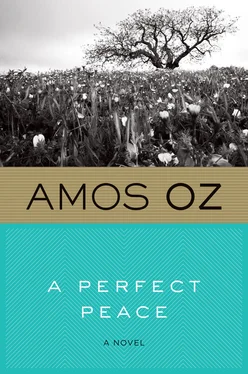Amos Oz - A Perfect Peace
Здесь есть возможность читать онлайн «Amos Oz - A Perfect Peace» весь текст электронной книги совершенно бесплатно (целиком полную версию без сокращений). В некоторых случаях можно слушать аудио, скачать через торрент в формате fb2 и присутствует краткое содержание. Год выпуска: 1993, Издательство: Mariner Books, Жанр: Современная проза, на английском языке. Описание произведения, (предисловие) а так же отзывы посетителей доступны на портале библиотеки ЛибКат.
- Название:A Perfect Peace
- Автор:
- Издательство:Mariner Books
- Жанр:
- Год:1993
- ISBN:нет данных
- Рейтинг книги:5 / 5. Голосов: 1
-
Избранное:Добавить в избранное
- Отзывы:
-
Ваша оценка:
- 100
- 1
- 2
- 3
- 4
- 5
A Perfect Peace: краткое содержание, описание и аннотация
Предлагаем к чтению аннотацию, описание, краткое содержание или предисловие (зависит от того, что написал сам автор книги «A Perfect Peace»). Если вы не нашли необходимую информацию о книге — напишите в комментариях, мы постараемся отыскать её.
“[Oz is] a peerless, imaginative chronicler of his country’s inner and outer transformations.” —
(UK)
A Perfect Peace — читать онлайн бесплатно полную книгу (весь текст) целиком
Ниже представлен текст книги, разбитый по страницам. Система сохранения места последней прочитанной страницы, позволяет с удобством читать онлайн бесплатно книгу «A Perfect Peace», без необходимости каждый раз заново искать на чём Вы остановились. Поставьте закладку, и сможете в любой момент перейти на страницу, на которой закончили чтение.
Интервал:
Закладка:
The next night a guest lacturer from the executive committee of the national trade union spoke in the dining hall on the plight of Soviet Jewry, reading from a large number of crumbling old letters that had reached him in devious ways from behind the Iron Curtain. His audience was composed almost exclusively of the older members of the kibbutz, the younger ones, with a single exception, having found other entertainment. Srulik the music man, who was sitting next to him, later swore to all his acquaintances that several especially heartrending passages had made the newcomer shed a tear. By the time the question period arrived, however, Azariah had either got a grip on himself or had had a change of heart, for he not only asked a question but refused to accept the answer given and continued to query the lecturer until a full-fledged argument broke out.
In one way or another, Azariah Gitlin was considered odd by most people who met him or who had heard about him from others. "Yolek's Spinoza," he was frequently called behind his back. High-school wits amended this to "Chimpanoza." Etan R. mimicked Azariah's manner and speech standing knee-deep in mud, dripping wet and orating about the nature of justice, which, after all, could be found only on a kibbutz, and at the same time demanding an urgent meeting with its "head." Yet not even Etan could help acquiescing, albeit with a shrug, when little Shimon claimed that the new mechanic could talk politics for hours and make them sound as thrilling as a detective or science-fiction story. There was nothing dull about him, provided, of course, that one had the time to listen.
Apart from an occasional smirk or snide remark, no one would have dreamed of hurting Azariah Gitlin. It took all kinds. If a bizarrely philosophical, overtalkative, and somewhat pathetic young man just happened to land among them, what harm was he doing? He worked hard, he did what he was told, and some said that he wasn't even half bad at it. Besides, you could see that he had had a hard life. Sometimes, during an argument in a committee, someone would cautiously poke fun at Yolek by saying, "Come on, Yolek, you're beginning to sound like that Spinoza of yours."
What was on most people's minds was neither Azariah Gitlin nor the headlines in the newspapers but the flooding taking place in the low-lying fields. The winter crops were in danger of rotting in the ground.
As for Yonatan, he returned to his silence. Rimona, too, never brought up the conversation they had had. She took to poring over a little English book from India about the depths of karmic suffering and the heights of astral purity. She had borrowed it from Azariah, and its margins bore his penciled comments in an agitated hand. Every evening, without fail, she sat down with it. The stove burned with a blue flame as always, and soft music continued to come over the radio.
All was calm between Rimona and Yonatan.
5
The land was calm, too. The fields were sodden and vapors rose from the earth whenever the winter sun emerged between one rain and the next.
One morning, as he was taking an early bus to Tel Aviv, where he was to attend a meeting of the Labor Party Central Committee, Yolek Lifshitz looked out the window at the washed pine trees whispering in the wind, redolent of peace and good will. All along the road running through the coastal plain new settlements had sprung up, gleaming white with roofs of red tile. All were constructed in straight lines, the houses equally spaced, as if designed by a bright, logical child. Between the houses the residents had already strung laundry lines, built shacks and storerooms, erected fences, put in trees and bushes, planted lawns, and hoed up beds of earth for flowers and vegetables.
Why, these are no less than the very things we set out to accomplish when we were young, thought Yolek. It's just that we gave them all kinds of high-flown names so that we could take ourselves seriously. We were coming to free this land of the primeval curse of its desolation, to tame its wilderness, to propitiate it, and to make it our home. Well, now the high-flown words are rooftops and treetops. Only why O foolish heart, this shame of feeling poetic about it? Instead of meeting today in Tel Aviv, we should all, every last one of us, be getting together under the open sky and breaking out into song, into a mighty paean of old pioneers. We should come just as we are, cracked of voice, wrinkled of face, stooped of shoulder. And what if we're laughed at? We can join in the laughter ourselves. If there are tears, let there be tears. We did what we said we would. Here it is, all around us, but why, then, this chill in an old heart?
The previous night Prime Minister Eshkol had addressed the nation and assured it that things were looking up. He spoke in the future tense, predicting better times and general prosperity, made some humorous quip about great efforts being rewarded in the end, warned against impatience, called for perseverance, and did not minimize the dangers ahead but nonetheless concluded with an optimistic quotation from the poet Bialik. Immediately afterwards, a special feature was broadcast about the restoration of the newly settled Ta'anach region to its ancient fertility, followed by a program of old pioneering songs.
At each stop, men bundled in work clothes boarded Yolek's bus. From time to time, whenever the sun peeked through the thick clouds, a sharp change swept over the mountains and valleys to the east. No sooner did light touch their slopes than they turned to a vibrant, luxuriantly deep green. Atop a newly built fence in a newly built village perched a bird, soaking wet. A cat scrounging among nearby garbage cans whose lids had been blown off by the wind pretended not to see it. Throngs of children trooped by on their way to school, cheap imitation-leather briefcases strapped to their backs. A blue and red poster on a signboard promised one and all a gala evening.
We are halfway through the sixties, thought Yolek. It is a long and rainy winter between wars, long enough for the people to fill their lungs with the scent of wet citrus groves and the fragrance of their fruit. When everyone is cultivating his garden, should not my task be to rejoice in our achievements and make others feel that joy too? Be not jaded, O foolish heart, but gala, and full of joy!
Nineteen sixty-five. A winter between wars. Before joy can prevail, all the nightmares, all the suffering, all the wounds must heal. But we're turning over a new leaf here. A safe haven for the Jewish people, that's what we used to say when we were young.
Yolek opened the window a crack, since the bus was full of cigarette smoke, to take a breath of fresh air. Ga'ash, Rishpon, Shefayim, the old village of Ra'anana — all these settlements along the road seemed to him like final, unchallengeable arguments in the age-old debate with ancient rivals that was still going on in his mind.
All around him, as if every minute were precious, settlers were digging into the flat, sandy strip of coast flanked by rocky mountains. Heavy equipment moved huge mounds of earth so that concrete foundations could be laid. Hilltops were being leveled every morning. Fields of weeds were being cleared, virgin brushland plowed, roads paved from village to village. Metals were being melted down to be cast in foundries. And all this while hordes of people were buying and selling, changing addresses and fortunes, scouting the lay of the land, searching for new opportunities. Apartments passed from hand to hand. Crafty maxims were rife. Strike while the iron is hot. Live by your wits. Don't look a gift horse in the mouth.
The people on the bus were reading newspapers in many languages besides Hebrew. Even the bus driver struck Yolek as being a recent immigrant, from Iraq probably, who had already managed to get ahead in life. All these desperate refugees, he thought. We gathered them here from the four corners of the earth. It's up to us to impart our dream to them and make it sing in their bones. Let not the warm but weary heart grow chill in these good times that we dreamed of through all those harsh years. Eshkol was right to have chosen last night to talk about the Ta'anach region. In this urban sprawl along the coast, building plots are selling like hotcakes. When the whole state of Israel seems on the verge of overflowing, why not the weary heart too? We still haven't said our last word. And that's how I'll begin today at the meeting. Without denying the dangers, without overlooking all that's wrong, I'll tell the party to open its eyes, to take a good look all about it, and rejoice. We've had enough gloom and doom.
Читать дальшеИнтервал:
Закладка:
Похожие книги на «A Perfect Peace»
Представляем Вашему вниманию похожие книги на «A Perfect Peace» списком для выбора. Мы отобрали схожую по названию и смыслу литературу в надежде предоставить читателям больше вариантов отыскать новые, интересные, ещё непрочитанные произведения.
Обсуждение, отзывы о книге «A Perfect Peace» и просто собственные мнения читателей. Оставьте ваши комментарии, напишите, что Вы думаете о произведении, его смысле или главных героях. Укажите что конкретно понравилось, а что нет, и почему Вы так считаете.












